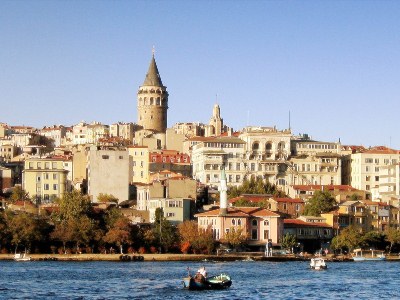What Turkey Can Teach Us
Slate |

In search of a more perfect union with Mexico.
By Parag Khanna
Declaring Mexico a "failed state" has become the new mantra in Washington and among the media. Over the last two years, the country's drug wars have claimed 10,000 lives, many in grisly beheadings reminiscent of Iraq or the Afghan-Pakistan border regions. But we have been bad neighbors, too: American narco-dollars have made Mexico the main conduit for Colombian cocaine, and an estimated 90 percent of the weapons used by Mexican drug cartels come from the United States.
On the economic front, Mexicans have long complained that they took to a very uneven playing field when they signed a free-trade agreement with the colossus of the north that didn't include some of the staples of Europe's common market such as freedom of labor movement and long-term development assistance for the poorest members of the club. But Mexicans needn't insist that NAFTA include EU-like development assistance of the kind that helped countries like Ireland, Spain, and Greece. They can instead hold out for the treatment the European Union has afforded Turkey. That's right, Turkey offers an intriguing lesson for officials on both sides of the Rio Grande. Turkey and Mexico, the two poorest members of the Organization for Economic Cooperation and Development, are relatively similar in population size, per-capita income, and inequality levels. The former is a bridge between East and West just as the latter is a bridge between North and South. American officials and intellectuals have grown accustomed to chiding Europeans for not moving ahead with EU membership for Turkey, as President Obama himself reiterated on his recent European tour. But would the United States ever grant Mexico anything like what Europe has already done for Turkey? In the 1990s, Turkey was hardly a paragon of stability. It was fighting a brutal struggle against guerrillas from the Kurdish Workers Party (known as the PKK), particularly in the country's southeast, from whence they fled over the border into Iraq. Turkish and Kurdish diasporas fought their battles on the streets of Germany, bombing each other's travel agencies and gas stations. The military even staged a soft coup in 1997 to oust Islamist Prime Minister Necmettin Erbakan. And Turkey was a major processing center for Afghan opium exported onward through the Balkans into Europe. But Turkey has had a free-trade agreement with the European Union since 1963, and Turkish guest workers on the continent, mostly in Germany, and their descendants today represent 85 percent of the Turkish diaspora (a huge proportion for such a nomadic civilization), sending back billions of dollars in remittances each year. At the same time, the vast majority of direct investment in Turkey also comes from Europe, resulting in an Istanbul business district that increasingly resembles a Western European skyline. Istanbul is a major financial hub for Syrians, Kazakhs, and other emerging markets seeking professional services and access to European markets. The lengthy process of EU accession has led to massive changes in Turkish governance, from abolishing the death penalty (even for PKK head Abdullah Ocalan), to minority and language rights for Kurds, to higher status for women in Turkish universities—and, of course, keeping the military out of politics. A once corrupt and murky border between Bulgaria and Turkey is now a 10-row highway and toll plaza. Nobody would call Turkey a failed state today, and the European Union's tough-love policy is much of the reason why. By contrast, Washington barely has a Mexico policy, only a failed immigration policy. The Zapatista insurgency, which was timed to humiliate the government of President Carlos Salinas once NAFTA took effect in 1994, has now been replaced by a narco-insurgency reminiscent of Colombia in the heyday of the Revolutionary Armed Forces of Colombia (known as FARC). The United States has stood by impassively as maquiladora plants on the border shut down due to Chinese competition, leading to rising inequality and thus to an increase in illegal immigration. At the same time, Mexico's government has allowed its greatest asset, the oil sector—which provides 40 percent of the budget—to atrophy. The solution is not simply to "isolate" or "contain" Mexico's drug cartels but also to invest in Mexican micro-entrepreneurs and industries to create jobs and discourage migration and participation in the drug trade or other criminality. Threatening to undo NAFTA is also regressive, since what Mexico and Central America need is more commercial activity "from Pueblo to Panama," rather than less. While the United States has underinvested in these areas, China has moved in. As our Western hemisphere blends together through energy dependence, migration, and investment, we can either export stability southward or import instability northward. The way things stand now, Mexican writers who once joked about the Reconquista of the American Southwest are more right than they realized. Rather than criticizing the European Union, we need to actively pursue a union of our own.
Parag Khanna is a senior research fellow in the American Strategy Program at the New America Foundation and author of The Second World: How Emerging Powers are Redefining Global Competition in the 21st Century. This article was produced with support from the New America Foundation.